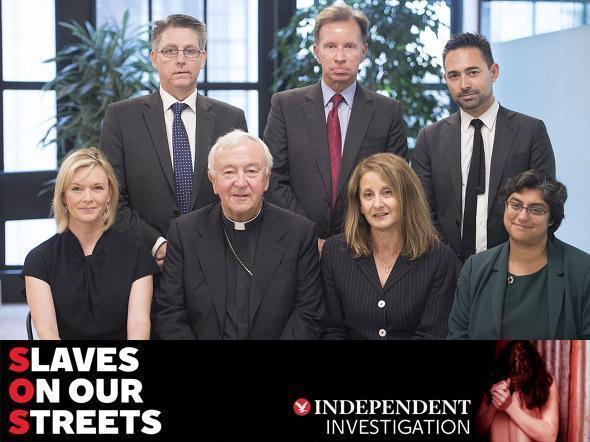Slaves on our Streets: Cardinal Nichols chairs think tank's first round table on abolishing modern slavery
Archbishop of Westminster and panel hear from sex trafficking survivor who stresses importance of giving a voice to those who have none

Cardinal Vincent Nichols, the Archbishop of Westminster, chaired the first Independent and London Evening Standard Round Table on Modern Slavery this morning, at the publications’ offices in London.
Comprised of leading figures from the worlds of business, law, philanthropy and media, over the coming months the round table will be coming up with proposals for combating modern slavery around the world.
These ideas will be presented at the Vatican in February, at the Santa Marta Group’s anti-slavery conference.
“We’re all delighted The Independent and Evening Standard have decided to lend their weight to this issue,” said Cardinal Nichols, in his introduction.
This week The Independent, working with the Evening Standard, launched a special investigation into modern slavery. Working with the Independent Anti-Slavery Commissioner, Kevin Hyland, over the coming months the investigation will be shining a light on slavery in its forms, showing readers what they can do to help and calling for specific action to fight the problem.
The National Crime Agency has estimated that there are tens of thousands of victims of modern slavery in the UK, yet only a tiny fraction of these are officially recognised. Not all of them are forced into sex work: car washes, nail bars and cannabis factories are all other common areas of exploitation and abuse.
At the start of the meeting, the panel heard from a British survivor of sex trafficking. She spoke about the importance of testimony from victims, and of giving a voice to those who have none. Each member of the group then made a short presentation before a more general discussion.
Speaking by video, Paul Polman, the CEO of Unilever, reiterated the need for a holistic approach with governments, businesses and individuals all pulling together. “It could have been us,” he said. “We are the lucky ones.”
“Transparency is culture, not just regulation,” echoed John Studzinski. “Around the world, we don’t yet have corporate leadership embracing ethical profit. A lot of it comes down to pension funds and asset managers. They need to ask themselves – is this profit ethical?’
He added that consumers have a role in scrutinising their purchases, from iPhones to T-shirts, and helping to name and shame companies that fail to be vigilant about modern slavery.
“It’s a scandal that we can be sitting in this office and within a mile is somebody who’s been deprived of their liberty and shipped across a whole continent under false pretences,” said Julie Etchingham. “We’re not calling it slavery because it’s a tabloid term, it’s the reality of how these people are living. The more we can raise awareness, the better.”
Who are the members of our anti-slavery think tank?
Kevin Hyland – Independent Anti Slavery Commissioner
Hyland was a police officer for 30 years until retiring in 2014 as a detective inspector, having been head of the Met’s Human Trafficking Unit. Hyland is the first Independent Anti-Slavery Commissioner after the role was created by the Modern Slavery Act 2015.
Julie Etchingham – ITN
Julie Etchingham is familiar to ITV viewers as the presenter of Tonight and a newsreader of the News at Ten. She has been reporting on modern slavery for ten years and will moderate the Santa Marta conference at the Vatican in February, having been involved in the group since its creation.
Paul Polman – CEO Unilever
Born and raised in Holland, Polman has been the CEO of Unilever since 2009. He has been a ferocious advocate for sustainability in supply chains – be that ecological or human. He argues that customers have the power to inspire global change.
Yasmin Waljee – Hogan Lovells
Yasmin Waljee is a human rights lawyer and the International Pro Bono Director at Hogan Lovells, an international law firm, overseeing all social enterprise and social finance work. She is also on the board of Mosaic, an initiative to help young Muslims in deprived areas.
Monique Villa – Thomson Reuters
As the CEO of the Thomson Reuters Foundation, Villa has oversight of their activities supporting journalism, women’s empowerment, the rule of law and human rights around the world, and has been a vocal campaigner against modern slavery.
Sir Matt Baggott – Former Chief Constable NI Police
Sir Matt Baggott joined the Met in 1978 and worked his way up to be one of the most senior and decorated officers of his generation, serving as chief constable of Northern Ireland police from 2009 until his retirement in 2014. He is the President of the Christian Police Association and trustee of the International Needs Charity.
John Studzinski – The Blackstone Group
John Studzinski is an Anglo-American investment banker who worked in M&A at Morgan Stanley and HSBC before joining Blackstone, where he is Vice Chairman of Investor Relations and Business Development. He is a tireless philanthropic campaigner with charitable interests in the arts, homelessness and human rights: he is a trustee of the Tate Foundation and the Vice Chair of Human Rights Watch.
Jean Baderschneider – Global Fund to End Slavery
Jean Baderschneider retired from ExxonMobil after 35 years as Vice President, Global Procurement. She is a committed anti-slavery activist, having sat as chair of the Global Leadership Council and on the board of Polaris, which focuses on stopping human trafficking. As the CEO of the Global Fund to End Slavery, she aims to create a world where slavery is no longer sustainable.
Subscribe to Independent Premium to bookmark this article
Want to bookmark your favourite articles and stories to read or reference later? Start your Independent Premium subscription today.

Join our commenting forum
Join thought-provoking conversations, follow other Independent readers and see their replies